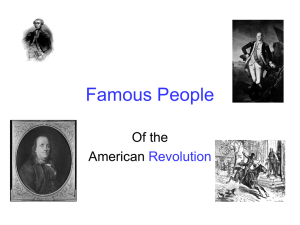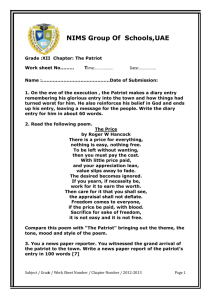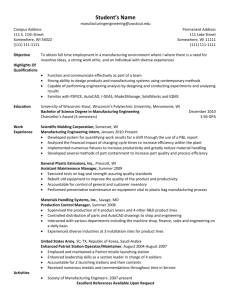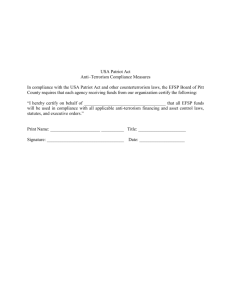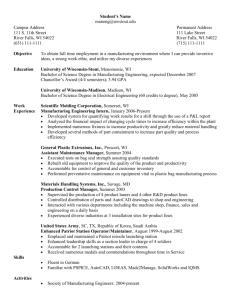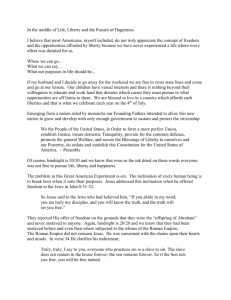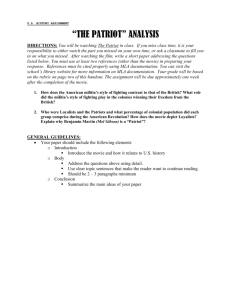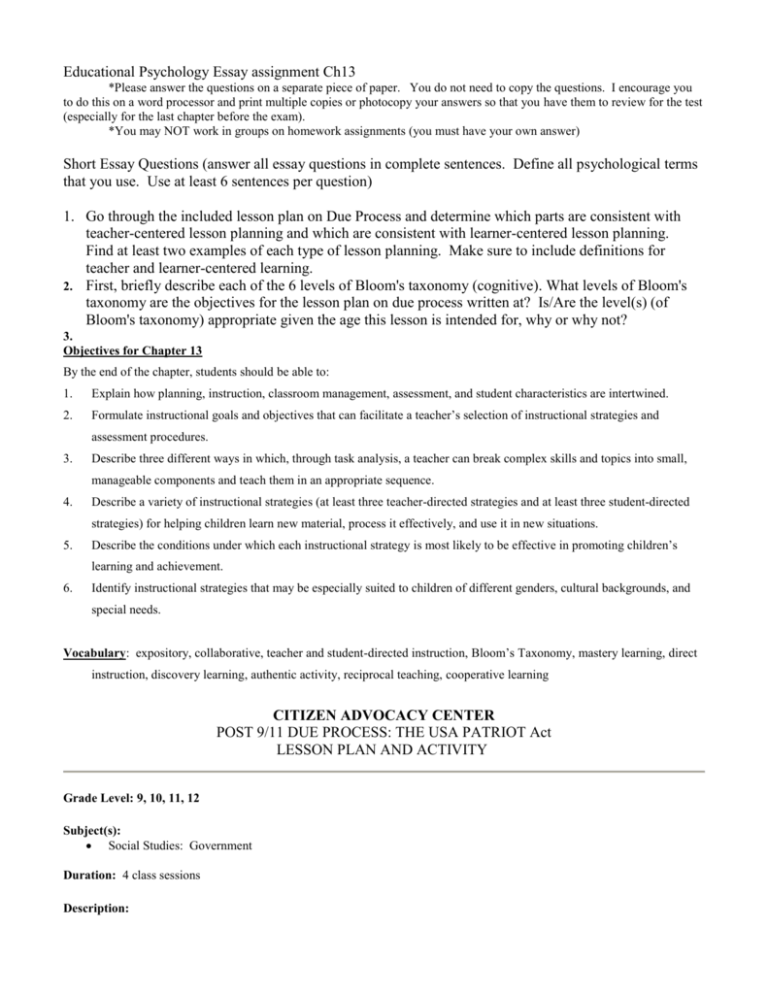
Educational Psychology Essay assignment Ch13
*Please answer the questions on a separate piece of paper. You do not need to copy the questions. I encourage you
to do this on a word processor and print multiple copies or photocopy your answers so that you have them to review for the test
(especially for the last chapter before the exam).
*You may NOT work in groups on homework assignments (you must have your own answer)
Short Essay Questions (answer all essay questions in complete sentences. Define all psychological terms
that you use. Use at least 6 sentences per question)
1. Go through the included lesson plan on Due Process and determine which parts are consistent with
teacher-centered lesson planning and which are consistent with learner-centered lesson planning.
Find at least two examples of each type of lesson planning. Make sure to include definitions for
teacher and learner-centered learning.
2. First, briefly describe each of the 6 levels of Bloom's taxonomy (cognitive). What levels of Bloom's
taxonomy are the objectives for the lesson plan on due process written at? Is/Are the level(s) (of
Bloom's taxonomy) appropriate given the age this lesson is intended for, why or why not?
3.
Objectives for Chapter 13
By the end of the chapter, students should be able to:
1.
Explain how planning, instruction, classroom management, assessment, and student characteristics are intertwined.
2.
Formulate instructional goals and objectives that can facilitate a teacher’s selection of instructional strategies and
assessment procedures.
3.
Describe three different ways in which, through task analysis, a teacher can break complex skills and topics into small,
manageable components and teach them in an appropriate sequence.
4.
Describe a variety of instructional strategies (at least three teacher-directed strategies and at least three student-directed
strategies) for helping children learn new material, process it effectively, and use it in new situations.
5.
Describe the conditions under which each instructional strategy is most likely to be effective in promoting children’s
learning and achievement.
6.
Identify instructional strategies that may be especially suited to children of different genders, cultural backgrounds, and
special needs.
Vocabulary: expository, collaborative, teacher and student-directed instruction, Bloom’s Taxonomy, mastery learning, direct
instruction, discovery learning, authentic activity, reciprocal teaching, cooperative learning
CITIZEN ADVOCACY CENTER
POST 9/11 DUE PROCESS: THE USA PATRIOT Act
LESSON PLAN AND ACTIVITY
Grade Level: 9, 10, 11, 12
Subject(s):
Social Studies: Government
Duration: 4 class sessions
Description:
This lesson plan stimulates classroom discussion on issues of security and civil liberties. The purpose of this exercise is to get
students to understand that the line between liberty and security is not always clear, and that liberty and security are largely
dependent on one another.
Goals:
ISBE Standards:
1. Social Science
14A: Understand and explain basic principles of the United States government.
Objectives:
1.
Students will be able to define the terms liberty and security.
2.
Students will be able to explain the relationship between liberty and security.
3.
Students will analyze issues surrounding the USA Patriot Act.
4.
Students will develop and debate arguments for and against the USA Patriot Act.
Assessment (added to LP):
1. Students will be given a take home essay in which they define and discuss the relationship between
liberty and security, summarize The USA Patriot Act and present arguments both for and against the USA Patriot
Act. Acceptable performance will be a C or better on the essay with the following criteria:
A Paper defines liberty and security, Student shows thoughtful analysis of the relationship between liberty and security,
student accurately summarizes what the Patriot Act is, student develops logical, supported arguments for the Patriot Act,
student develops logical, supported arguments against the Patriot act. Paper is free from grammatical and spelling errors.
Paper has excellent organization and flow.
B
Paper defines liberty and security, Student shows acceptable analysis of the relationship between liberty and security,
student accurately summarizes what the Patriot Act is, student develops acceptable arguments for the Patriot Act, student
develops acceptable arguments against the Patriot act. Paper has few grammatical and spelling errors. Paper has good
organization and flow.
C
Paper defines liberty and security, Student shows some analysis of the relationship between liberty and security, student
accurately summarizes what the Patriot Act is, student develops at least one argument for the Patriot Act, student develops
at least one argument against the Patriot act. Paper has some grammatical and spelling errors. Paper has acceptable
organization and flow.
D Paper attempts to define liberty and security, Student shows some discussion of the relationship between liberty and
security, student attempts to summarize what the Patriot Act is, student has only discussed arguments either for or against
the Act, or arguments are not logical Paper has many grammatical and spelling errors. Paper has weak organization and
flow.
F
Paper lacks a definition of liberty and security, Student shows weak or no discussion of the relationship between liberty
and security, student fails to summarize what the Patriot Act is, student has does not discuss arguments for or against the
Patriot Act Paper has excessive grammatical and spelling errors. Paper has no organization or flow.
Materials:
1.
2.
3.
4.
5.
Notebook paper/pen
Blank overhead, whiteboard or chalkboard
Copy of “The Freedom Balance: worksheet” for each student
Pack of rights cards for each student
Address information for your local official
Instruction and Activities:
Activity One: The Freedom Balance
For lecture:
In any government, there has always been a delicate balance between liberties and security. In the United States, liberties are
those rights that are protected by the Bill of Rights as well as the more general liberty to live our lives how we want. But we
can’t always do whatever we want. For example, I may get really angry and want to hit someone, but if everyone were allowed
to hit each other when they got mad, no one would feel safe. This is part of the reason why we have laws against hurting other
people. When we feel safe, we also feel freer to live our lives and do things like ride the bus, go to the playground, or take a
walk. But at the same time, if we have too many laws for safety, we start to lose liberty. For example, if the government can
know everything about our lives to make sure everyone is behaving well, we lose some of our right to live our lives privately.
Pass out the Freedom Balance Worksheet. Have the students work either individually or in small groups to try and categorize
the words given. The purpose of this exercise is to get the students to realize that the line between liberty and security isn’t
always clear and that liberty and security are largely dependent on one another.
After they have completed the exercise, ask the students these questions:
1.
2.
3.
4.
Take a poll: How many of you had trouble deciding which words belonged in the categories? Which ones were
hardest to categorize?
Why did you have difficulty deciding?
Looking at how you categorized the words, do you see any relationship between liberty and security? How are they
similar? How are they different?
What do you think is more important in a democracy, liberty or security? Why?
The Freedom Balance: worksheet
Instructions:
Look at the phrases and words below and decide if they represent liberty, security, or both. For liberty, circle the word.
For security, put a box around the word. If it is both liberty and security, underline. Have a reason to support your
answer.
DUE PROCESS
SEARCH WARRANT
WAR
ID CARDS
CENSORSHIP
DEMOCRACY
SAFETY FROM HARM
DEFENSE
PROTESTS
GOVERNMENT
SPYING
TERRORISM
FREE SPEECH
JULY 4, 1776
CONSTITUTION
LAWS
FBI
EQUALITY
POWER
The Patriot Act
Congress passed the USA Patriot Act in 2001 after the attacks on the World Trade Center in 2001. This group of new laws
was meant to give law enforcement (FBI, CIA, Police, Military) new ways to find out more information about people and
capture people they think might be dangerous. But some of these new laws affect our due process rights too.
For example, in furtherance of the “War on Terror,” the Bush administration has labeled some individuals as “enemy
combatants.” These individuals are alleged to be involved in or to have supported terrorist activities. Enemy combatants can
be held indefinitely without charge and without the right to an attorney.
Under international humanitarian law (the laws of war), a criminal suspect cannot be labeled as an enemy combatant except
where there has been direct participation in or connection to an international armed conflict. The ACLU among other groups
has attacked the administration’s use of the “enemy combatant” classification as violating the US Constitution’s guarantees to
speedy trial, to be formally charged, due process, attorneys in criminal proceedings, etc.
Activity Two: The USA Patriot Act and the Constitution
Pass out to students the pack of rights cards. Each card represents a different due process right or other liberty guaranteed by
the Constitution to both citizens and immigrants.
Choose one half of the class. Tell them they are the immigrant group. The other group will be the U.S. citizens.
Read the provisions of the Patriot Act. For each provision, either the immigrant group or both the immigrant and citizen group
will have to give up a card. When an immigrant loses a right, he or she should pass the card to a citizen. When both lose
rights, they should turn the card face down.
Patriot Act scenarios to read:
1. All non-citizen males of Middle-Eastern descent must report to the Immigration and Naturalization Service to “register.”
Once there, many are detained and held in jails without notice for questioning regarding terrorist activities.
2. Individuals who are named “enemy combatants” by the president are held without being charged with a crime and without
access to a lawyer, and are given non-public hearings by military tribunals.
3. The FBI is given permission to search the records of libraries, bookstores, internet coffee houses, etc. for internet search
records and book purchase/check-out records without informing you first.
4. Government officials listen in on conversations between jailed immigrants who are terrorist suspects and their lawyers.
5. Immigrants who associate with certain religious organizations, charities, and churches are subject to investigation merely
because they are members or are acquaintances with members of those organizations. For example, Rashid, a 15 year-old boy,
is a member of the local Muslim Youth Group. The Youth Group is affiliated with the local mosque. A cleric with the local
mosque is critical of the US government, and states in a speech that he understands why the World Trade Center was bombed.
As a result, the government investigates the cleric and everyone who is associated with the mosque as member or employee,
including Rashid.
Follow-up Questions:
1. How did you feel when you had to give up the cards? Did you feel it was right? Why or why not?
2.
The Patriot Act was passed right after 9/11/2001 when terrorists hijacked three planes and destroyed the World Trade
Center and severly damaged the Pentagon in Washington, D.C. Do you think the government is acting reasonably by
putting these new rules in place? Do you see any problems with the rules?
Have the students do a secret vote for this question:
3.
Do you think it’s okay for the FBI to interview Arab-Amercians just based on their race? For example, do you think
it’s fair for the government to pull people out of line at the airport and question them because they are Arab? Write
down your answer and why you answered that way on a piece of paper and pass it to the teacher to read aloud
anonymously. Get reactions from the class about what the students wrote. Why do they agree or disagree?
Extension Activity:
1. For those students that want to, have them write a letter to their local representative saying why they agree or disagree with
some or all of the Patriot Act.
Rights Cards
Right to appeal a guilty verdict
The police must have a reason to interview you other than your national origin or race
Right to join a certain kind of activist group without being monitored
Right to privacy between a lawyer and a client being held in jail. Right to public trial by a jury
Right to be free from criminal investigation unless there is a good cause for it.
Right to privacy when you are on the phone or using the Internet
Right to be notified when the police are going to search your property
The government must charge you with a crime to hold you in jail
©Copyright 2005 Citizen Advocacy Center. All rights reserved. No part of this lesson plan may be reproduced in any form or
by any means without the prior, written permission of the Citizen Advocacy Center. The Citizen Advocacy Center is a
501(c)(3) non-pofit, non-partisan community based legal organization.


